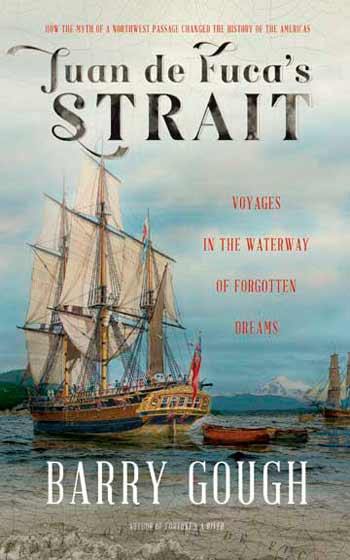A tale rich with adventure, dreams and exploration forms the history of Juan de Fuca’s Strait in a new book by a Canadian author.
The famous strait connects Puget Sound to the Pacific Ocean and serves as a dividing line between the U.S. and Canada.
Barry Gough recently presented and signed his new book, “Juan de Fuca’s Strait: Voyages in the Waterway of Forgotten Dreams,” at the Coupeville Library.
“Any book signing like this that’s adding another historical resource to the library of local history is valuable,” said Rick Castellano, executive director of the Island County Historical Museum.
The book begins in 16th century Venice when explorer Juan de Fuca spoke of the Northwest Passage, a marine passageway connecting the Pacific and Atlantic oceans.
This fabled waterway inspired explorers from Spain, Great Britain and other empires to search in hopes of fame, adventure and riches.
Gough researched and shares the journeys of Martin Frobisher, James Cook, Francis Drake, Manuel Quimper, José María Narváez, George Vancouver and Juan Francisco de la Bodega y Quadra, among others.
Castellano described the history of Juan de Fuca’s Strait as “colorful.”
“We read so much about the history of the eastern United States, but there’s so much history coming out of this neck of the woods,” he said. “Vancouver’s expedition out here alone was remarkable in itself, and the thousands of years of Native American history before that.”
Juan de Fuca’s Strait is now a dividing line between the U.S. and Canada, but before that, “it was a dividing line for two different cultures of Native Americans,” Castellano said.
When Vancouver explored the area in 1792, he thought the strait was the Northwest Passage. When it wasn’t, he thought Deception Pass would be the Northwest Passage, but Joseph Whidbey found otherwise and the island was named for his efforts, Castellano said.
Another detail Castellano found interesting was that Juan de Fuca was Greek, but he took a Spanish name because he was exploring for Spain.
“This promises to be a very enriching program because the history of this area runs so deep,” Castellano said. “I’m just excited he’s coming here and we have another book to add to our research library.”
“Juan de Fuca’s Strait” is available to purchase at the Island County Museum in Coupeville.
A recent book signing was sponsored by the Ebey’s Landing National Historical Reserve, Friends of the Coupeville Library, Island County Historical Society, Compass Rose Inn and Harbour Publishing.
For more information, call the Island County Historical Museum at 360-678-3310.


